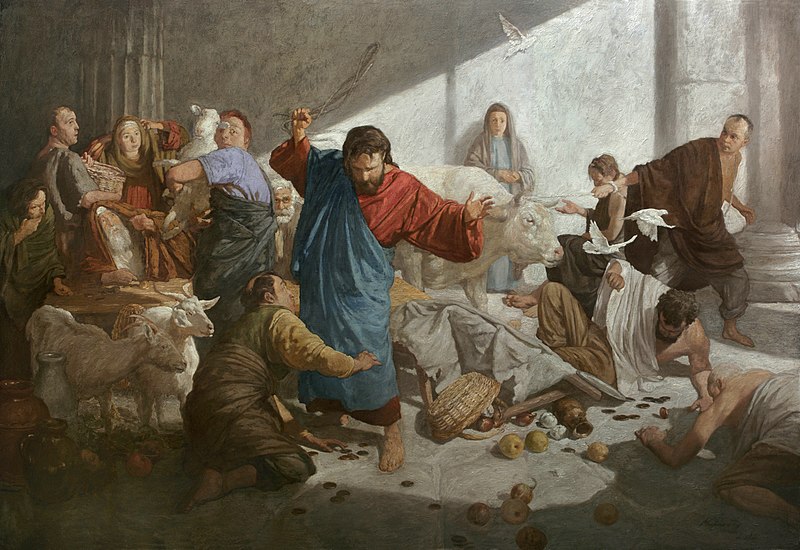これまでの連載、特に先週のエッセイ「教会に集まるために世界は存在する」に対していただいたいくつかの批評に答えることから始めよう。この連載では、実際の経験とは相反することを強調し、あえて力を入れた。そのため、それに対する反発を予想していたのだが、多くの読者は見識が高いようだ。
[toggle]Let me begin this essay by responding to some critiques of the series up to this point, and especially about last week’s essay, “The Church Does Not Exist for the Sake of the World.” While most readers seem appreciative, I expected pushback for the counterintuitive emphasis I’m trying to bring to bear in the series. [/toggle]いま私が使った「強調」という言葉に注意してほしい。別に私は、「隣人を愛することを忘れるべきだ」と言っているわけでも、「神をたたえる際、教会は宣教活動に手を伸ばすべきではない」と論じているわけでもないことを、注意深い読者は分かっているはずだ。したがって、「二元的思考」や「誤った二分法」を非難する人は、私が実際に書いたものを誤読している。
[toggle]Note that word—emphasis. The careful reader sees that I’m not saying that we should forget about loving our neighbor and that I’m not arguing that in glorifying God the church should not reach out in mission. Thus the charges of “binary thinking” or of offering a “false dichotomy” are a failure to read what I’ve actually written. [/toggle]要点を言うと、「福音派ムーブメントは、特に神のための活動を偶像にしている」と私は主張しているのだ。重要な点は、私たちの感情と心から神がますます離れてしまうということだ(とはいえ、神の言葉は常に私たちと共にある)。私たちが最初の愛に戻るということは、2番目の愛、つまり隣人への愛の重要性を否定するということではない。そして、私たちの偶像礼拝を問うのは、イエスが神殿から両替人を追い出した時と同じように(マタイ21:12など)、「二元的思考」でも「謝った二分法」でもない。
[toggle]More to the point: I’m arguing that the evangelical movement in particular has made an idol of activity for God, to the point that God has been increasingly eclipsed from our hearts and minds (though he is still on our lips, to be sure). To call us back to our first love does not mean that I deny the importance of our second love—the neighbor. And to question our idolatry is not binary nor a false dichotomy any more than it was for Jesus when he cleared the moneychangers from the Temple. [/toggle]ここで明確にしておこう。私はイエスではなく、両替人だ。私は、主の深い愛と永続的な愛を犠牲にして、日常生活と⼈間同⼠の交わりにとらわれている。
[toggle]Let me be absolutely clear here: I am not like Jesus; I am very much a moneychanger, caught in the nexus of daily life and worship of the horizontal at the expense of a deep and abiding love for my Lord. [/toggle]
アンドレイ・ミローノフ「神殿から商人を追い払う」
次の批評に私は同意する。宣教を考えている人は、教会のミッションではなく、神のミッションについて真っ先に話しているということに私が気づいていないという指摘だ。神のミッションは、世界をご自身のもとに集めることであり、私たちはただ神のミッションに参加するにすぎない。そのとおり。しかし、ここで思い描かれている神は、私たちが想像の中で作り上げた神ではないだろうか。つまり、私たちは自分の行動や活動にあまりにも夢中になっているので、神について、ミッションを持つ存在として以外には考えることができないのだ。
[toggle]One critique I agree with: I failed to note that many missional thinkers are not first and foremost talking about the church’s mission but God’s. That is, it is God’s mission to bring the world to himself, and we just participate in his mission. Fair enough. I will say, however, that I wonder if this picture of God is an instance where we’ve created God in our image. That is, we are so absorbed with doing and acting that we just can’t imagine God as anything other than one who has a mission himself. [/toggle]神の本質は、静的な「ビーイング」(あること)というより、ダイナミックな「ドゥーイング」(行うこと)、「純粋な行為」であるという神学的議論があることを私は認める(たとえばカール・バルト)。しかし、私は完全にはそう確信していないと言えば十分だろう。問題は、もし神がミッションを持っているなら、神が何らかのかたちで満たされておらず、満たされるべきミッションを成し遂げる必要があるということだ。これは神人同性論のように私には思われる。そして、活動依存症を合理化するために私たちを誘惑するだけだ。その代わり、神の御子イエスは自らを「安息日の主」と呼ばれたが、その「安息」という現実に生きるものとして特徴づけられた神の現実を守るよう、私たちは招かれたのかもしれない(ヘブル4:6~11)。トマス・アクィナスは、とにかく天の完成を考えた。しかし、ここでの私の考えは暗示的にすぎず、このテーマに注目しているだけだということは認めよう。
[toggle]I grant that there is a theological argument that says God’s essence is not so much a static “being” as much as a dynamic “doing” or “pure act” (e.g., Barth). Suffice it to say, I’m not completely convinced—the main problem being that if God has a mission, that means he is unfulfilled in some way and thus has to complete a mission to be fulfilled. This strikes me as anthropomorphic and only tempts us to rationalize our addiction to activity. Instead, we might be called to abide in the reality that God, whose Son called himself “The Lord of the Sabbath,” is characterized as living in a reality described as “rest” (Heb. 4:6–11). This is how Thomas Aquinas, among others, thought of heavenly perfection anyway. But I will also admit my thinking here is merely suggestive and that this subject deserves more of my attention. [/toggle]もう一つの批評はもっと皮肉たっぷりだ。ある尊敬されている教授は、ジャン・カルヴァンやカール・バルト、そして他の神学者たちの考えを考慮に入れない「大学のレポート」を私が書いたと言う。実際、私のエッセイが大学のレポートと同じくらい高レベルだとは恐縮至極だ。ほとんどのジャーナリストと同様、私のエッセイは高校の読書レベル(ほとんどのジャーナリスト記事における通常のターゲット)で理解してもらいたいのだが、どうやらそれには失敗したようだ。
[toggle]Another critique is more ironic. One respected professor says I’ve written nothing but a “college essay” that doesn’t take into account the thinking of John Calvin, Karl Barth, and other theologians. Actually, I’m sorry to hear that my essays are at as high a level as a college essay! Like most good journalists, I want my essays to be comprehended by a high-school reading level (the usual target for most journalistic outlets), but apparently I’ve failed. [/toggle]「実際に教会の使命は、世界をより良い場所にすることだ」と考えるバルトのようなプロテスタント神学者の言葉を筆者は引用し続けた。私はバルトの伝記を書き、プロテスタントの神学書(カトリックと正教会も)をかなりよく読み込んでいるが、聖書自体がこの一般的なプロテスタントの見解を支持していないと私は最初から主張している。言うまでもなく、私は「教会の神学」を書いているのではなく、最初で最大の教えを犠牲にして、隣人愛から偶像を作ったという議論をしていると、はっきり言わなければならない。
[toggle]The writer went on to quote Protestant theologians, like Barth, who think the church’s mission is, in fact, to make the world a better place. Though I’ve written a biography of Barth and am fairly well read in Protestant theology (and Catholic and Orthodox as well), I’m making a starting argument that the Bible itself does not support this common Protestant view. It nearly goes without saying—but apparently I have to say it—that I am not writing a “theology of the church” as such but mostly making an argument that we’ve made an idol out of neighbor love at the expense of the first and greatest commandment. [/toggle]この議論が実際には証明できないことを私は認める。心の中の偶像礼拝は、議論の中でできる種類の証明の対象にはならないからだ。福音派の文化に組み込まれてきた自分の半世紀が、この運動の長所と弱点への洞察を与えてくれたのではないかと私は思う。結局のところ、私の分析が真実に近いかどうかを確かめるため、読者には、自らの経験と心を見直してもらえればと思っている。「それは自分の教会の経験や私の心を反映したものではない」と誰かが答えるなら、私は神を賛美することしかできない。しかし、私がこれまでに受け取った応答は、この問題はいたるところで深刻な問題であり、注意と祈りが必要であることを示唆している。(後編に続く)
[toggle]I acknowledge that the argument cannot really be proven—for idolatry of the heart is not subject to proof of the sort one can make in an argument. I’m assuming that my half-century of being embedded in evangelical culture may have given me some insights into the movement’s strengths and weaknesses. In the end, I’m mainly asking readers to review their own experiences, as well as their own hearts, to see if my analysis is anywhere close to the truth. If someone replies, “Well, it doesn’t reflect my church experience or my heart,” I can only say praise God! But the responses I’ve received so far suggest that the problem is a serious one in many quarters and needs attention and prayer. [/toggle]
